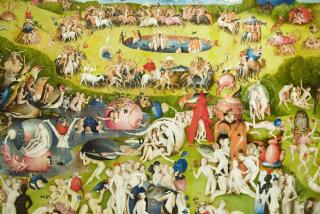BOOK REVIEW / MEMOIR : Dahmer’s Father Also Asks, ‘Why?’ : A FATHER’S STORY <i> by Lionel Dahmer</i> ; Morrow, $20, 255 pages
The story of Jeffrey Dahmer is strange enough: a tale of stalking, torture, mutilation, murder and cannibalism. But there’s something truly startling and deeply unsettling about “A Father’s Story” by Lionel Dahmer--it’s a post-mortem of Jeffrey Dahmer’s life and crimes as told by his father.
Lionel Dahmer seems to anticipate the likely reaction of his readers, and he announces at the very outset of “A Father’s Story” that “a portion of the proceeds” from his book will be donated to the families of his son’s victims, although he is quick to concede that “no donation can atone for such tremendous loss.”
The very same tone of awkwardness, embarrassment and clumsy self-justification prevails throughout the book, as if Dahmer knows what we are asking ourselves: Do we really need to know the Dahmer family’s side of the story?
But the fact is, “A Father’s Story” is really more about Lionel Dahmer than his son, a heartfelt effort at self-analysis and self-revelation by a bewildered father forced to accept that his son is a mass murderer: Where did I go wrong?
Dahmer is rather circumspect in describing the details of his son’s crimes. Still, Jeffrey Dahmer is very much the focus of “A Father’s Story.” And, as Dahmer describes Jeffrey’s birth, his early childhood, and the long, agonizing but irreversible descent into a particularly gruesome kind of madness, “A Father’s Story” begins to read like a sequel to “Rosemary’s Baby.”
He recalls that 4-year-old Jeffrey was fascinated by the animal bones he found under the porch of the family home. He describes how young Jeffrey demanded that a Halloween jack-o-lantern be carved with a mean face instead of a happy one. And he describes the heartbreaking experience of watching a “happy, ebullient” child drift into an unreachable nether world.
“The boy who sat across from me at the dinner table,” Dahmer writes, “his face now adorned with glasses, his eyes dull, his mouth set in a motionless rigidity, was drifting into a nightmare world of unimaginable fantasies.”
So “A Father’s Story” is Dahmer’s almost desperate attempt to explain to himself why his son turned out to be such a monster. Was it the medication that his wife took during pregnancy? Was it the result of Lionel’s passivity and aloofness during Jeffrey’s childhood? Or was it a grotesque manifestation of the emotional and psychological frailties that Lionel Dahmer knew as a child?
“A Father’s Story” bears all the tool marks of a man who has submitted himself to an intensive course of psychotherapy, although the author never says so. Lionel Dahmer confesses to “a strange numbness at (his) core,” and allows that his failure to notice his son’s weirder aspects was “an exercise in denial and avoidance.”
Dahmer insists on convicting himself of parental negligence. When he describes the letters that his son routinely receives--an outpouring of mail from the sick, the scary and the needy--Dahmer again flagellates himself.
“Clearly, some of these people believe that in some bizarre way, my son could rescue them from lives in which they felt entrapped,” Dahmer writes. “It demonstrated a level of sympathy and pity that I simply could not reach. . . . I often wondered why, in a world of so much feeling, I could express so little.”
Dahmer works himself up to an almost frantic confession of some vague genetic offense against nature. He once tried to hypnotize a childhood playmate, and he taught himself how to make bombs as an adolescent, and he links these peculiarities to his son’s awful crimes.
“As a scientist, (I) wonder if (the) potential for great evil . . . resides deep in the blood that some of us . . . may pass on to our children at birth,” writes Dahmer, a chemist.
So we begin to realize that Dahmer is merely one more of his son’s victims, and “A Father’s Son” is a kind of crude self-exorcism intended to draw out the demon that afflicts him. And his agony is so deep that we can hardly begrudge him the right to try.
More to Read
Sign up for our Book Club newsletter
Get the latest news, events and more from the Los Angeles Times Book Club, and help us get L.A. reading and talking.
You may occasionally receive promotional content from the Los Angeles Times.









